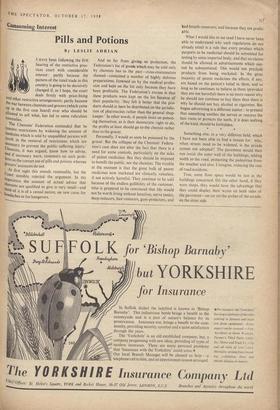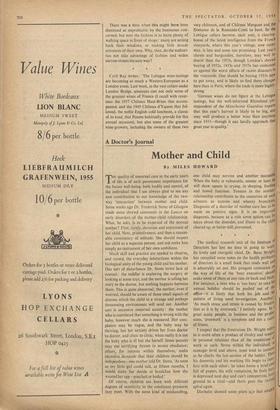Pills and Potions
By LESLIE ADRIAN I HAVE been following the first hearing of the restrictive prac- tices court with considerable interest : partly because the pattern of the retail trade in this country is going to be decisively changed if, as I hope, the court • deals firmly with price-fixing and other restrictive arrangements; partly because the war between chemists and grocers (which came up in the first case heard) over who should be allowed to sell what, has led to some ridiculous anomalies.
The Chemists' Federation contended that `to remove restrictions by widening the amount of Medicine which is sold by unqualified persons will result in the removal of restrictions which are necessary to prevent the public suffering injury.' Chemists, it was argued, know how to advise, and if necessary warn, customers on such prob- lems as the correct use of pills and potions whereas grocers' assistants do not.
At first sight this sounds reasonable, but the Court sensibly rejected the argument. In my experience the amount of actual advice that chemists are qualified to give is very small—and Most of it is of a casual nature, on new cures for headaches or for hangovers. And so far from. giving us protection, the Federation's list of goods which may be sold only by chemists has in the past—cross-examination showed—contained a number of highly dubious preparations, frowned on by the medical profes- sion and kept on the list only because they have been profitable. The Federation's excuse is that these products were kept on the list because of their popularity; 'they felt it better that •the pro- ducts should at least be distributed on the jurisdic- tion of pharmacists rather than the general shop- keeper.' In other words, if people insist on poison- ing themselves, as is their democratic right to do, the profits at least should go to the chemist rather than to the grocer.
Personally, I would as soon be poisoned by the grocer. But the collapse of the Chemists' Federa- tion's case does not alter the fact that there is a need for some controls, particularly on the sales of patent medicines. But they should be imposed to benefit the public, not the chemists. The trouble at the moment is that the great bulk of patent medicines now marketed are clinically valueless, if not actively harmful. They continue to be sold because of the endless gullibility of the customer, who is prepared to be convinced that life would not be worth living without laxatives, nerve tonics, sleep-inducers, hair-restorers, gum-protectors, and bad-breath removers; and because they are profit- able.
What I would like to see (and I have never been able to understand why such regulations do not already exist) is a rule that every product which purports to be medicinal should be submitted for testing by some impartial body; and that no claims should be allowed in advertisements which can- not be substantiated. This would not preclude products from being marketed. In the great majority of patent medicines the effects, if any, are based on the patient's belief in them, and so long as he continues to believe in them (provided they are not harmful) there is no more reason why he should not continue to buy them than there is why he should not buy alcohol or cigarettes. But bogus advertising is a different matter : to pretend that something soothes the nerves or restores the hair roots or protects the teeth, if it does nothing of the kind, should be forbidden.
* * Something else, in a very different field, which I have not been able to find a reason for : why, when streets need to be widened, is the arcade system not adopted? The pavement would then run inside the outer wall of the buildings, adding width to the road, protecting the pedestrian from the weather and also, I imagine, reducing the rate of road accidents.
True, some floor space would be lost in the buildings concerned. On the other hand, if they were shops, they would have the advantage that they could display their wares on both sides of the pavement—on (or in) the arches of the arcade, on the street side. There was a time when this might have been dismissed as unprofitable by the businesses con- cerned; but now the fashion is to leave plenty of walking space in front of shops : many are setting back their• windows, or making little arcade entrances of their own. Why, then, do the authori- ties not take advantage of fashion and widen narrow streets the easy way?
* * *
Cyril Ray writes: `The Lebegue wine-tastings are becoming as much a Western-European as a London event. Last week, in the vast cellars under London Bridge, amateurs met not only some of the greatest wines of France (I recall with rever- ence the 1937 Château Haut-Brion that accom- panied, and the 1949 Château d'Yquem that fol- lowed, the noble English cold luncheon, a classic of its kind, that Pimms habitually provide for this annual occasion), but also some of the greatest wine-growers, including the owners of these two very châteaux, and of Château Margaux and the Domaine de la Romande-Conti to boot. So the Lebegue cellars become, each year, a clearing- house of the latest, intelligence from the French vineyards, where this year's vintage, now under way, is late and none too promising. Last year's clarets and burgundies, therefore, may well be dearer than the 1955s, though London's shrewd buying of 1952s, 1953s and 1955s has cushioned us against the worst effects of recent disasters in the vineyards. One should be buying 1955s now to put away, and is likely to find them cheaper here than in Paris, where the trade is more highly- strung.
'German wines do not figure at the Lebegue ' tastings, but the well-informed Rhineland col respondent of the Manchester Guardian reports that this year's harvest is likely to be big, and may well produce a better wine than anything since 1953—though it can hardly approach that great year in quality.'



































 Previous page
Previous page